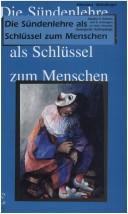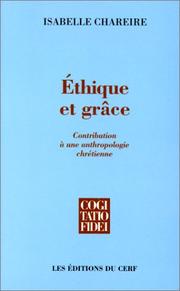| Listing 1 - 9 of 9 |
Sort by
|

ISBN: 9780300149890 Year: 2009 Publisher: New Haven Yale University Press
Abstract | Keywords | Export | Availability | Bookmark
 Loading...
Loading...Choose an application
- Reference Manager
- EndNote
- RefWorks (Direct export to RefWorks)
"What is sin? Is it simply wrongdoing? Why do its effects linger over time? In this sensitive, imaginative, and original work, Gary Anderson shows how changing conceptions of sin and forgiveness lay at the very heart of the biblical tradition. Spanning nearly two thousand years, the book demonstrates how sin, once conceived of as a physical burden, becomes, over time, eclipsed by economic metaphors. Transformed from a weight that an individual carried, sin becomes a debt that must be repaid in order to be redeemed in God's eyes." "Anderson shows how this ancient Jewish revolution in thought shaped the way the Christian church understood the death and resurrection of Jesus and eventually led to the development of various penitential disciplines, deeds of charity, and even papal indulgences. In so doing it reveals how these changing notions of sin provided a spur for the Protestant Reformation." "Broad in scope while still exceptionally attentive to detail, this ambitious and profound book unveils one of the most seismic shifts that occurred in religious belief and practice, deepening our understanding of one of the most fundamental aspects of human experience."--BOOK JACKET.
Sin --- Péché --- Sin. --- 233.2 --- 241.4 --- Theological anthropology --- Transgression (Ethics) --- Actuele zonde:--dogmatische aspecten --- Theologische ethiek: schuld; zonde; bekering; verzoening --- 241.4 Theologische ethiek: schuld; zonde; bekering; verzoening --- 233.2 Actuele zonde:--dogmatische aspecten --- Péché --- History of doctrines
Book
ISBN: 9782355260506 2355260508 Year: 2010 Publisher: Paris Nouvelles Editions Lignes
Abstract | Keywords | Export | Availability | Bookmark
 Loading...
Loading...Choose an application
- Reference Manager
- EndNote
- RefWorks (Direct export to RefWorks)
233.2 --- 1 BATAILLE, GEORGES --- Actuele zonde:--dogmatische aspecten --- Filosofie. Psychologie--BATAILLE, GEORGES --- 1 BATAILLE, GEORGES Filosofie. Psychologie--BATAILLE, GEORGES --- 233.2 Actuele zonde:--dogmatische aspecten --- Christianisme --- Philosophie allemande --- Philosophie et religion
Book
ISBN: 9780691128900 Year: 2012 Publisher: Princeton Princeton University Press
Abstract | Keywords | Export | Availability | Bookmark
 Loading...
Loading...Choose an application
- Reference Manager
- EndNote
- RefWorks (Direct export to RefWorks)
"Ancient Christians invoked sin to account for an astonishing range of things, from the death of God's son to the politics of the Roman Empire that worshipped him. In this book, award-winning historian of religion Paula Fredriksen tells the surprising story of early Christian concepts of sin, exploring the ways that sin came to shape ideas about God no less than about humanity. Long before Christianity, of course, cultures had articulated the idea that human wrongdoing violated relations with the divine. But Sin tells how, in the fevered atmosphere of the four centuries between Jesus and Augustine, singular new Christian ideas about sin emerged in rapid and vigorous variety, including the momentous shift from the belief that sin is something one does to something that one is born into. As the original defining circumstances of their movement quickly collapsed, early Christians were left to debate the causes, manifestations, and remedies of sin. This is a powerful and original account of the early history of an idea that has centrally shaped Christianity and left a deep impression on the secular world as well"--
Religious studies --- Christian moral theology --- Sin --- Theological anthropology --- Transgression (Ethics) --- Christianity --- History of doctrines --- #GGSB: Dogma- en theologiegeschiedenis --- 233.2 --- 276:241 --- 233.2 Actuele zonde:--dogmatische aspecten --- Actuele zonde:--dogmatische aspecten --- Patrologie. Patristiek-:-Moraaltheologie. Theologische ethiek --- Dogma- en theologiegeschiedenis

ISBN: 3825870146 3854001282 Year: 2003 Volume: 16 Publisher: Münster LIT
Abstract | Keywords | Export | Availability | Bookmark
 Loading...
Loading...Choose an application
- Reference Manager
- EndNote
- RefWorks (Direct export to RefWorks)
233.2 --- 2 RAHNER, KARL --- 2 SCHWAGER, RAYMUND --- Actuele zonde:--dogmatische aspecten --- Godsdienst. Theologie--RAHNER, KARL --- Godsdienst. Theologie--SCHWAGER, RAYMUND --- 2 SCHWAGER, RAYMUND Godsdienst. Theologie--SCHWAGER, RAYMUND --- 2 RAHNER, KARL Godsdienst. Theologie--RAHNER, KARL --- 233.2 Actuele zonde:--dogmatische aspecten --- Sin --- Theological anthropology --- Man (Christian theology) --- Christianity --- Rahner, Karl, --- Schwager, Raymund.
Book
ISBN: 9782343003870 9782336291109 Year: 2013 Publisher: Paris L'Harmattan
Abstract | Keywords | Export | Availability | Bookmark
 Loading...
Loading...Choose an application
- Reference Manager
- EndNote
- RefWorks (Direct export to RefWorks)
Error --- Sin --- Christian ethics --- Erreur --- Péché --- Morale chrétienne --- 233.2 --- 241.4 --- 241 <09> --- Actuele zonde:--dogmatische aspecten --- Theologische ethiek: schuld; zonde; bekering; verzoening --- Moraaltheologie. Theologische ethiek--Geschiedenis van ... --- 241.4 Theologische ethiek: schuld; zonde; bekering; verzoening --- 233.2 Actuele zonde:--dogmatische aspecten --- Péché --- Morale chrétienne --- Moraaltheologie. Theologische ethiek--Geschiedenis van .. --- Moraaltheologie. Theologische ethiek--Geschiedenis van . --- Moraaltheologie. Theologische ethiek--Geschiedenis van
Book
ISBN: 2204046167 9782204046169 Year: 1993 Volume: 1 Publisher: Paris Cerf
Abstract | Keywords | Export | Availability | Bookmark
 Loading...
Loading...Choose an application
- Reference Manager
- EndNote
- RefWorks (Direct export to RefWorks)
Salvation. --- Anthropologie religieuse --- Mal --- Théologie --- Dieu. --- Foi. --- Guilt --- Theology --- Good and evil --- Guilt. --- Sin, Original --- Liberation theology --- Anthropologie théologique - Christianisme --- Good and evil. --- God (Christianity) --- Sin, Original. --- Philosophical theology --- Bien et mal --- Théologie philosophique --- Dogmatiek --- Depravity --- Original sin --- Fall of man --- Evil --- Wickedness --- Ethics --- Philosophy --- Polarity --- Religious thought --- Christianity --- Trinity --- #GOSA:III.Sch.M --- #GOSA:V.T.M --- #GROL:MEDO-216 --- #gsdb3 --- 216 --- 233.2 --- 233.2 Actuele zonde:--dogmatische aspecten --- Actuele zonde:--dogmatische aspecten --- Goed en kwaad --- Christian dogmatics --- Anthropologie théologique
Book
ISBN: 9782204099158 2204099155 Year: 2012 Volume: 547 Publisher: Paris Cerf
Abstract | Keywords | Export | Availability | Bookmark
 Loading...
Loading...Choose an application
- Reference Manager
- EndNote
- RefWorks (Direct export to RefWorks)
"Participer de près ou de loin à un sacrifice aux dieux païens est une faute qui exclut de l'Église. Mais que faire lorsque des dizaines, des centaines de chrétiens ont commis cette faute? Sous l'empereur Dèce, en 250, on risquait la prison, l'exil, la confiscation des biens, la torture, la mort même, si l'on ne participait pas aux sacrifices publics exigés par l'empereur pour ressouder l'unité du monde romain. Beaucoup ont faibli, sont tombés, ce sont les lapsi. Des rigoristes n'envisageaient aucune réconciliation pour ces lapsi ; des laxistes accueillaient les fautifs sans vraie repentance, surtout s'ils étaient porteurs de billets d'indulgence signés par des martyrs avant leur mort ou par des confesseurs de la foi. Entre les deux, Cyprien refuse d'interdire l'espoir, mais exige qu'on prenne conscience de la gravité de la faute commise et qu'on pratique une authentique pénitence, dans les larmes, la prière, le jeûne, l'aumône. Exhorter les fautifs pour qu'ils se plient à ces exigences, c'est les aimer vraiment et leur ouvrir l'espérance"--Publisher description.
Patrology --- Church discipline --- Persecution --- Eglise --- Persécutions --- Early works to 1800. --- Early works to 1800 --- Discipline --- Ouvrages avant 1800 --- Cyprian, --- History --- Critical edition --- 233.2 --- 276 =71 CYPRIANUS, THASCIUS CAECILIUS --- #GGSB: Latijnse patrologie (tekst) --- Actuele zonde:--dogmatische aspecten --- Latijnse patrologie--CYPRIANUS, THASCIUS CAECILIUS --- 233.2 Actuele zonde:--dogmatische aspecten --- Critical edition. --- Persécutions --- Christians --- Religious persecution --- Atrocities --- Discipline, Church --- Discipline, Ecclesiastical --- Ecclesiastical discipline --- Church polity --- Persecutions --- Latijnse patrologie (tekst) --- Church discipline - Early works to 1800 --- Persecution - Rome --- Church discipline - History - Early church, ca 30-600 --- Cyprian, - Saint, Bishop of Carthage - De lapsis
Book
ISBN: 2204052965 9782204052962 Year: 1996 Publisher: Paris Cerf
Abstract | Keywords | Export | Availability | Bookmark
 Loading...
Loading...Choose an application
- Reference Manager
- EndNote
- RefWorks (Direct export to RefWorks)
Au XVIIe siècle, la communauté juive vit des jours heureux; elle est plus que tolérée et participe au développement extraordinaire de la ville. Là, Menasseh ben Israël, le rabbin le plus célèbre d’Europe, contemporain de Spinoza, tout en respectant l’exceptionelle hospitalité du monde calviniste, va prendre parti résolument dans la crise religieuse et politique qui menace l’unité de la jeune République des Provinces-Unies. La querrelle porte sur le libre arbitre de l’hommme, la foi et les œuvres, le salut.
Judaism --- Judaïsme --- Works to 1900. --- Ouvrages avant 1900 --- Free will and determinism --- Sin --- -Religious aspects --- Works to 1900 --- 233.2 --- -Judaism --- Sin (Judaism) --- Jews --- Religions --- Semites --- Compatibilism --- Determinism and free will --- Determinism and indeterminism --- Free agency --- Freedom and determinism --- Freedom of the will --- Indeterminism --- Liberty of the will --- Determinism (Philosophy) --- Actuele zonde:--dogmatische aspecten --- Religious aspects --- Religion --- 233.2 Actuele zonde:--dogmatische aspecten --- Judaïsme --- Theological anthropology --- Transgression (Ethics) --- Free will and determinism - Religious aspects - Judaism - Early works to 1800 --- Sin - Judaism - Early works to 1800 --- Judaism - Works to 1900

ISSN: 05876036 ISBN: 2204059854 9782204059855 Year: 1998 Volume: 209 Publisher: Paris Cerf
Abstract | Keywords | Export | Availability | Bookmark
 Loading...
Loading...Choose an application
- Reference Manager
- EndNote
- RefWorks (Direct export to RefWorks)
Prenant comme point de départ la critique nietzschéenne du christianisme, cet ouvrage montre que la pertinence de celle-ci est conjoncturelle, et non point structurelle. Le Dieu chrétien n'est pas réductible au seul Dieu de la moralité : l'Ancien Testament et le Nouveau Testament attestent de la gratuité de l'amour du Dieu de l'Alliance et du Dieu chrétien. S'inscrivant dans la ligne d'une éthique téléologique, la deuxième partie du livre dégage les grandes lignes de l'éthique aristotélicienne et analyse l'articulation opérée par Paul Ricoeur dans Soi-même comme un autre, entre les moments déontologique et téléologique. Le détour par Thomas d'Aquin permet d'introduire la dimension théologale de l'éthique chrétienne. A partir de concepts élaborés par Paul Ricoeur, la troisième partie articule morale, éthique et théologalité. Loi et désir sont pensés en lien avec la Règle d'or.
Christian moral theology --- Christian dogmatics --- Philosophical anthropology --- Grace (Theology) --- Christian ethics. --- Ethics. --- Anthropologie philosophique --- Grâce (Théologie) --- Morale chrétienne --- Morale --- Ricoeur, Paul --- Thomas, --- Christian ethics --- Ethics --- Ricœur, Paul --- 233.2 --- 234.1 --- Deontology --- Ethics, Primitive --- Ethology --- Moral philosophy --- Morality --- Morals --- Philosophy, Moral --- Science, Moral --- Philosophy --- Values --- Ethical theology --- Moral theology --- Theology, Ethical --- Theology, Moral --- Christian life --- Christian philosophy --- Religious ethics --- Actuele zonde:--dogmatische aspecten --- Leer over de genade. De gratia --- Thomas Aquinas, Saint --- Lü-ko-erh --- Ricœur, P. --- Li-kʻo, Pao-lo --- ريكور، بول --- ريكور، پول --- Рикёр, Поль --- Rikër, Polʹ --- Ricœur, Paul. --- Ricœur, Jean Paul Gustave --- 234.1 Leer over de genade. De gratia --- 233.2 Actuele zonde:--dogmatische aspecten --- Ricœur, Paul, --- Grâce (Théologie) --- Morale chrétienne --- Akʻvineli, Tʻoma, --- Akvinietis, Tomas, --- Akvinskiĭ, Foma, --- Aquinas, --- Aquinas, Thomas, --- Foma, --- Thomas Aquinas, --- Tʻoma, --- Toma, --- Tomas, --- Tomasu, --- Tomasu, Akwinasu, --- Tomasz, --- Tommaso, --- Tʻovma, --- Тома, Аквінський, --- תומאס, --- תומס, --- اكويني ، توما --- Ākvīnās, Tūmās, --- اكويني، توما, --- آکويناس، توماس, --- Ricœur, Paul, - 1913-2005 --- Thomas, - Aquinas, Saint, - 1225?-1274
| Listing 1 - 9 of 9 |
Sort by
|

 Search
Search Feedback
Feedback About UniCat
About UniCat  Help
Help News
News